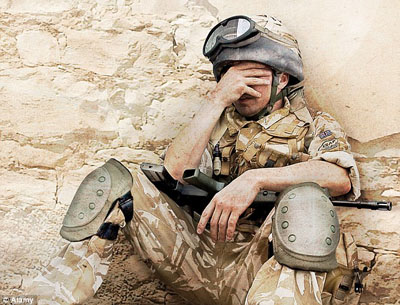By Jenny Makin
More army veterans are seeking help for mental health problems, a new report has revealed.
The physical scars Sgt Jay Baldwin bears from the war in Afghanistan are impossible to ignore.
Sitting in his wheelchair, he does nothing to hide the protruding stumps of his legs from public view.
And if anyone were to ask him, he wouldn’t shy away from telling them the whole graphic story – he may even show you the horrific images – of the moment he stood on a hidden bomb that ripped off his legs and part of his arm.
The 28-year-old, who serves with the 1st Battalion, Princess of Wales’s Royal Regiment – nicknamed The Tigers – is one of hundreds of soldiers who have become amputees having served in the military both in Iraq and Afghanistan.
And for more on Jay's story, see today's Daily Echo or check the website tomorrow.

Troops who are deployed in direct combat on the battlefield had a higher risk of post-traumatic stress disorder.
But as a new report revealed this week, there could be tens of thousands more veterans from the wars – which have claimed the lives of more than 600 British soldiers in the past ten years – who carry debilitating wounds that nobody can see.
Combat Stress, the charity that has been helping veterans since the end of the Second World War, has revealed record rises in people seeking help for mental health problems in the past year.
Last year, 358 referrals were Afghanistan-related, compared to 228 in 2012, and the organisation is expecting a peak in numbers again this year as the UK withdraws its troops after 13 bloody years.
The number of Iraq veterans needing help has also leapt by 20 per cent – despite British forces leaving the country five years ago.
It is predicted that in years to come, one in five soldiers will need help with numbers reaching 42,000 who served in Iraq and Afghanistan – although it could take up to 13 years to show itself in some veterans.
Brigadier Matt Maer, who started his Army career with The Tigers after being commissioned in 1985 and also commanded the regiment on the Iraq frontline in 2004, warned the figures were just the tip of the iceberg.
And that, in part, is why he is now helping to run a charity called Friends of PWRR, which is designed to financially help Hampshire soldiers past and present as well as supporting those who have left the regiment to find work.
He said: “I think the thing about stress and post-traumatic stress disorder is that there is an element that sits inside you, unbeknown, for some time.
“It can emerge many years down the line in some people, and one of the reasons for The Friends is that these people are just like me and others who have come out of the Army.
“They can be walking down your high street and, just as the illness emerges, there is a danger they are very likely away from the people who they shared those experiences with and become overtaken with thoughts of anxiety, loneliness and ‘nobody understands’.”
Brig Maer added: “The numbers are bound to increase – but the good news, if you can call it that, is that it is much more recognised not just by former soldiers but by society as a whole.
“There is thankfully a greater public and medical awareness now – but it remains the case that the hardest thing is for the guys themselves to recognise if something isn’t right – and to then step forward and admit they have a problem.”



